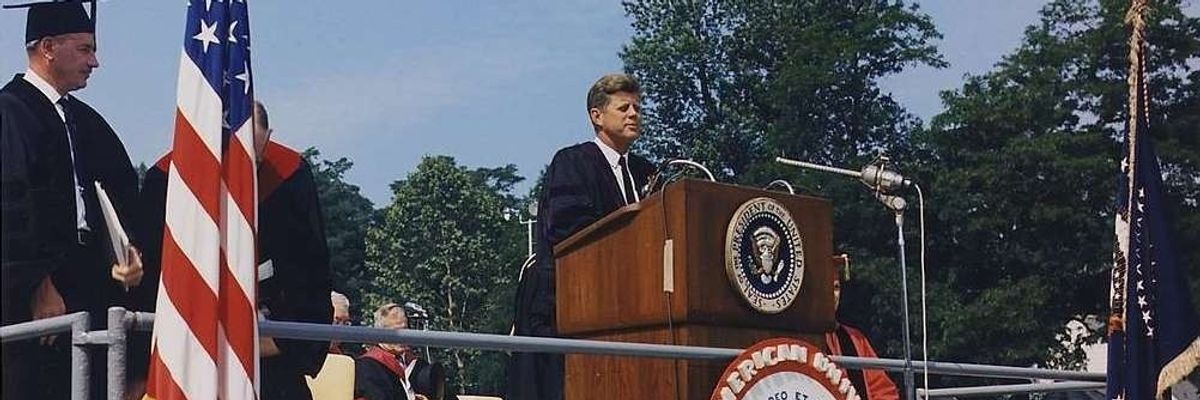June 10th marks 60 years since American President John F. Kennedy delivered a searing critique of the Cold War and its mindset at a commencement address on the campus of American University in Washington, DC.
In it, Kennedy expounded upon his vision of what peace might look like in the nuclear age.
“What kind of peace do we seek?,” he asked.
"Not a Pax Americana enforced on the world by American weapons of war. Not the peace of the grave or the security of the slave. I am talking about genuine peace, the kind of peace that makes life on earth worth living, the kind that enables men and nations to grow and to hope and to build a better life for their children — not merely peace for Americans but peace for all men and women — not merely peace in our time but peace for all time."
For Kennedy, the specter of nuclear war, to which the United States and the U.S.S.R. came within a hair's breadth the previous October during the Cuban Missile Crisis, made the pursuit of peace with the Soviet adversary an imperative. Yet it was one that put the young president at odds, perhaps fatally so, with this own national security-military-intelligence establishment.
But at AU, Kennedy took his case for a sane, rational and above all ethical Cold War policy directly to the American people.
“I speak of peace,” said Kennedy, “as the necessary, rational end of rational men. I realize that the pursuit of peace is not as dramatic as the pursuit of war — and frequently the words of the pursuer fall on deaf ears. But we have no more urgent task.”
And Kennedy had, over the course of his presidency, and to the great consternation of the Pentagon and CIA, found a most unlikely partner in that pursuit, Soviet leader Nikita Khrushchev. Over the course of a series of U.S.-Soviet crises (the Bay of Pigs, the Vienna summit, and the Berlin Crisis) Kennedy and Khrushchev had developed a rapport which helped steer us away from apocalypse during the Cuban Missile Crisis. And in the aftermath of that crisis, the two began working toward a Nuclear Test Ban Treaty.
Kennedy realized that progress was contingent upon seeing the other as we might wish we to be seen, in other words, upon empathy.
“No government or social system is so evil,” said Kennedy, “that its people must be considered as lacking in virtue.”
"So, let us not be blind to our differences but let us also direct attention to our common interests and to the means by which those differences can be resolved. And if we cannot end now our differences, at least we can help make the world safe for diversity. For, in the final analysis, our most basic common link is that we all inhabit this small planet. We all breathe the same air. We all cherish our children's future. And we are all mortal."
Such a way of thinking about the current Russian adversary is now notably absent in the corridors of power of Joe Biden’s Washington.
Indeed, in our view, Kennedy’s speech now stands as an important indictment of how far in the wrong direction recent Democratic administrations have traveled in the decades since Kennedy’s speech. While we are both on record condemning Putin’s invasion, we are mindful of the administration’s failure to pursue diplomatic avenues to both prevent and end the war.
Today we stand perilously close to nuclear escalation as the administration ignores the red lines it set and succumbs to assorted hawks by agreeing to send F-16s to Ukraine. One can only hope President Kennedy’s message, delivered six decades ago this Saturday, somehow and in some way is understood by a new generation inside and outside Washington D.C., and has an impact on the course of war — and peace.
















